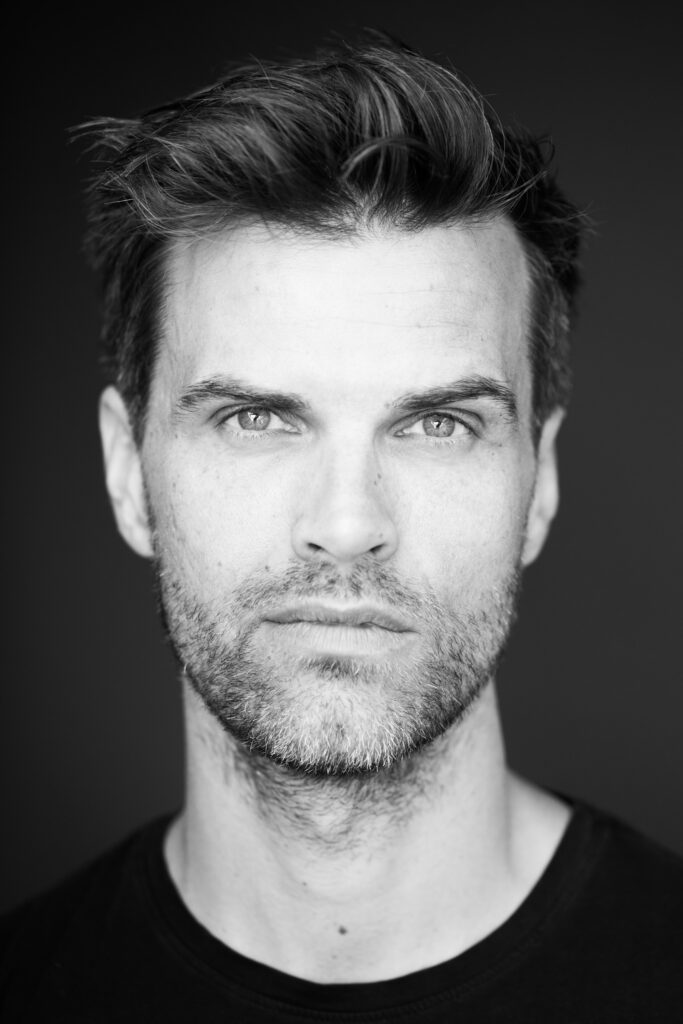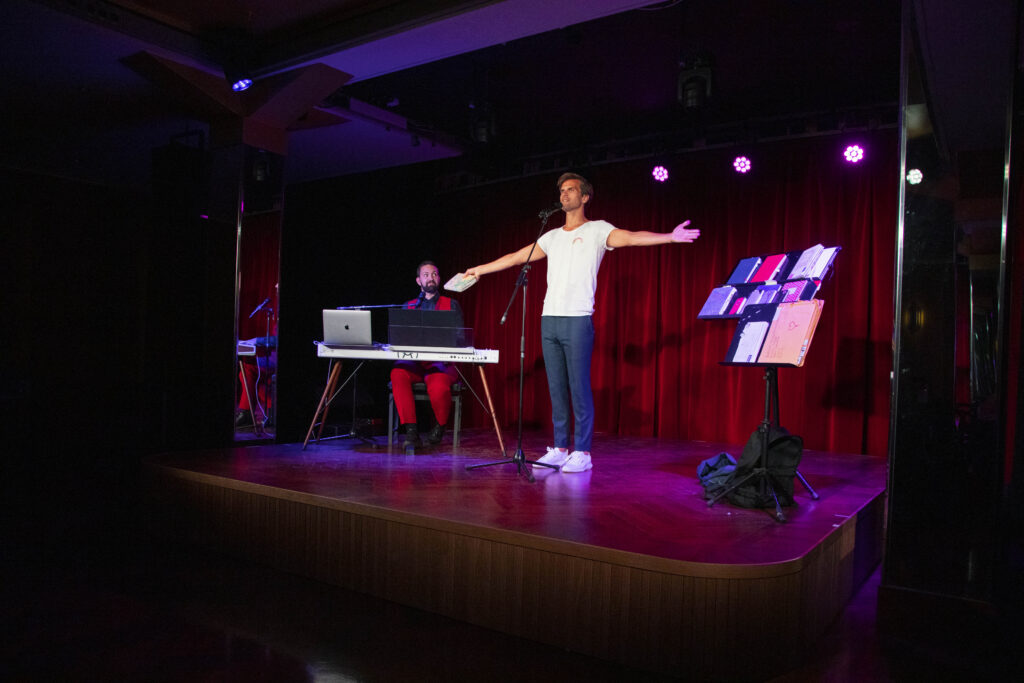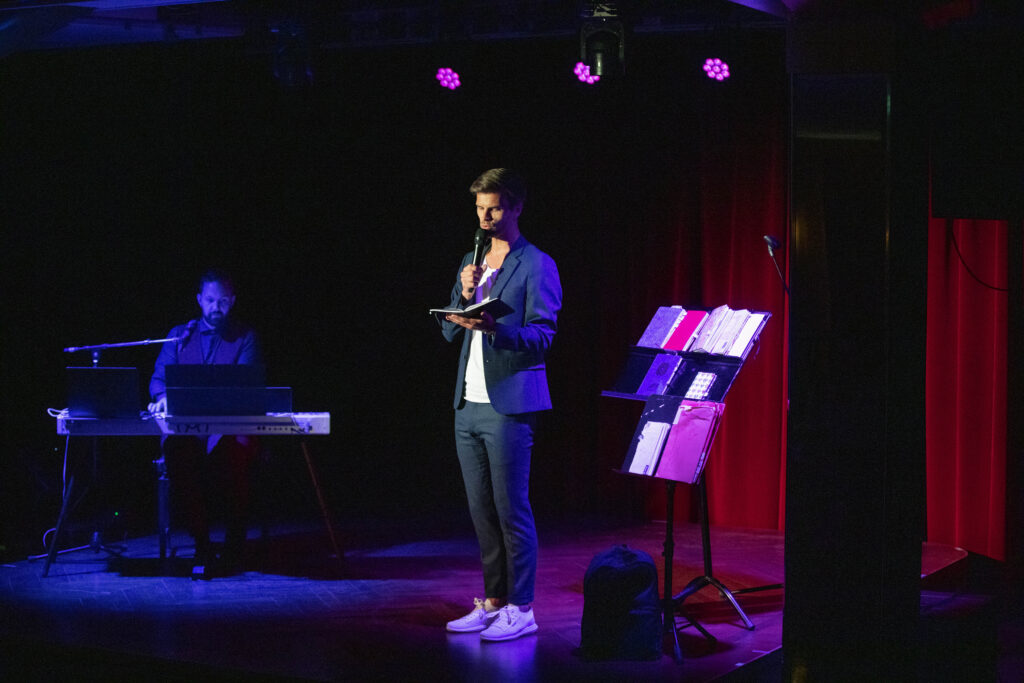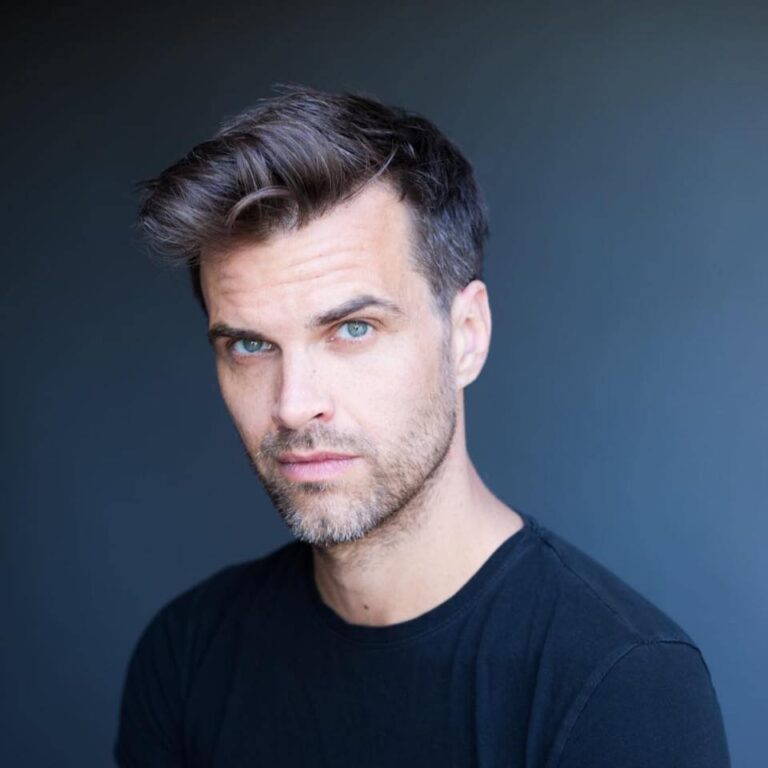Opening this week at the National Theater is Góðan Daginn Faggi (Good Day, Fag), a one man show from thespian Bjarni Snæbjörnsson. Described as an autobiographical one man musical, Góðan Daginn Faggi will premiere at Þjóðleikhúsið.
In a Facebook post about the show’s creation Bjarni says the idea for the show came from a collection of letters he wrote as a child. “When I was in my hardest time as a young man, I wrote everything in diaries and letters. We are now using my writing to create a new autobiographical documentary musical.” In the show, Bjarni looks at his life story and asks provocative questions about himself, life and society. He promises “this will be a show that will make you cheer, provoke, cry, and make you think.” To find out more about Góðan Daginn Faggi, GayIceland chatted with Bjarni about the queer vulnerability, childhood traumas, and reclaiming words of hate thrown at us.
The writing he did as a child proved to be the foundation of the performance. “When I was a teenager I journaled ferociously, writing down everything during the phase when I was coming out, around twenty years old. I moved recently and found all my journals and read through them wondering who that person was. I was writing these letters to my mom via email while living in Australia. I printed them all out as if I knew I would need them later. Turns out, my mom printed and saved all of the emails too,” says Bjarni.
Although it’s based on a true story of his personal experiences, not everything in Góðan Daginn Faggi is literal or exact. “Of course there are parts of me that are still from when I was that young, but a lot has changed. I’m going to be on the stage, it’s my story on the stage. It’s not made to be a character or changed to appeal to a broader audience. Although this is my story, this is also the story of us all,” he says.
When Bjarni felt it was time to come out to his parents, he also did it through a letter. “I left it under my mom’s pillow and left for Reykjavik for a few days to let it sink in.”
Moving from Tálknafjörður in the Westfjords, one of Iceland’s most remote and sparsely populated areas, to Reykjavík, Bjarni found a lot of the culture he was craving. That small town didn’t have many queer role models for him to look up to. Even magazines were hard to come by. “I had no exposure to gay culture,” says Bjarni. “We had two radio channels and one TV channel, and if it wasn’t on those, it didn’t exist. I don’t even remember really seeing magazines until I grew up and went to Reykjavik.”

Once he was older and out of the closet, Bjarni eventually began to unpack all the bullying he had faced as a kid and its effect on him. “It was a very emotional journey to just go through all of these notes and letters and diaries and re-experience all the bullying from primary school. I had forgotten how much it affected me and shaped me.”
“This will be a show that will make you cheer, provoke, cry, and make you think.”
Since he was in a super small community and an even smaller primary school class, Bjarni was singled out for being different at every chance. “I was the only one to be called hommi (gay), stelpastraukur (girly-boy), and other names. I didn’t even understand what hommi really meant, I just knew it was derogatory.”
All of these emotions and traumas resurfaced for Bjarni, coalescing in a nervous breakdown. “I really completely collapsed from all the self-hatred and all the years of heteronormativity. I just burst. It was so horrible and freeing at the same time.”
It made him question how he would sit, the tone of his voice, all of his mannerisms and how they appeared. “Heteronormativity is so oppressive and really affects every action and thought we have,” he says. “How we move, how we think.”
The way Bjarni sees it, broken queer children actually turn out to be some of the best artists and creators. “We are a broken and fabulous bunch that comes out of this oppression and creates wonderful beautiful things. Just writing this play has already served its purpose for me. It’s been three years of going through all of this and condensing it down. Deep down, we are all vulnerable children who want nothing more than to belong, to be with and to be seen,” he says.

Quoting The Velvet Rage, a book on gay psychology by Alan Downs, Bjarni says queer children are constantly experiencing little papercuts, mini-traumas that manifest themselves as PTSD later in life. In his beforementioned post on Facebook he mentions that it’s his sincere hope is that the show will open people’s eyes to systematic prejudice against gay people as a whole. “The work is precisely to investigate conscious and unconscious prejudices and what needs to be done to have a difficult conversation about the issue.”
Even within the theater scene in Iceland, Bjarni feels progress can be made. Everyone assumes the theater is a safe haven for the queer community, but that doesn’t mean it’s free of stigma. “I went through a period of rage this past summer thinking about all the systemic homophobia, even in the theater and acting business. I went to all of my contacts trying to remind them that I can play both gay and straight roles. I’m not just the sassy gay man that’s flamboyant. I can play that, of course. I have played it and I love playing it to represent the queer community, but there’s more to acting than just that.”
“I really completely collapsed from all the self-hatred and all the years of heteronormativity. I just burst. It was so horrible and freeing at the same time.”
Since Iceland is so small, it makes it harder to be a diverse actor. Bjarni says the Icelandic theater community is very different from those abroad. “Here it’s more difficult for gay actors to get roles, whereas abroad it’s just assumed almost every guy in the theater is gay (laughs).”
Taking this show to a wide audience is the goal for Bjarni. He says it’s not just for gay men or queer audiences to come see. After all, it’s important for all of us to find our relationship with the prejudices we experience. Through the performance Bjarni wants to show how opening yourself up and making these changes can be revolutionary. “I wanted to challenge myself to be truly vulnerable. Vulnerability is a force that can change the world.”

Tickets for the show can be purchased at the link here. Góðan Daginn Faggi opens at 9pm on Friday, August 13th. Other shows will be throughout August and into the fall. For all dates and info, check the ticket link above.
Author and actor: Bjarni Snæbjörnsson
Author and director: Gréta Kristín Ómarsdóttir
Music by Axel Ingi Árnason


